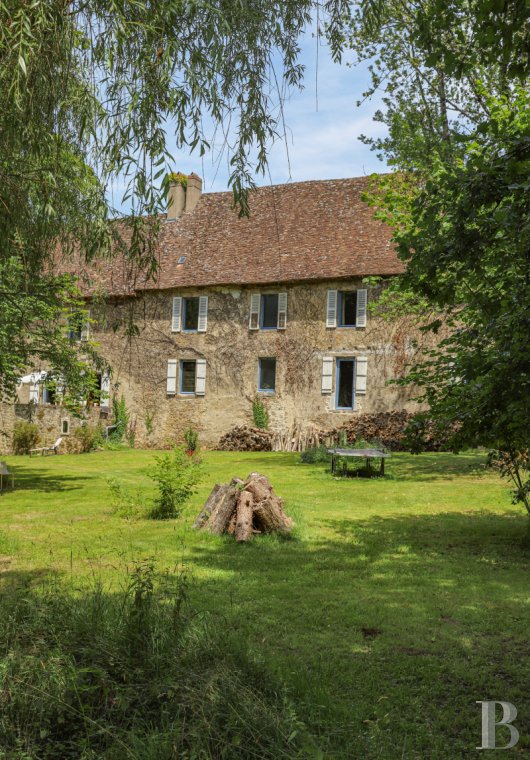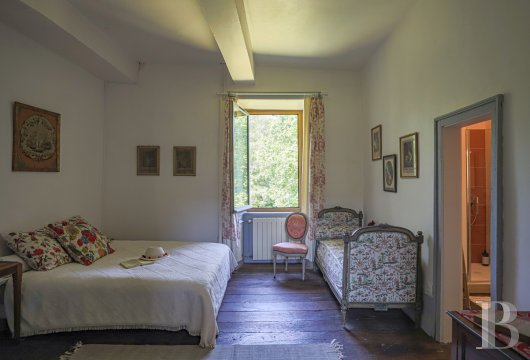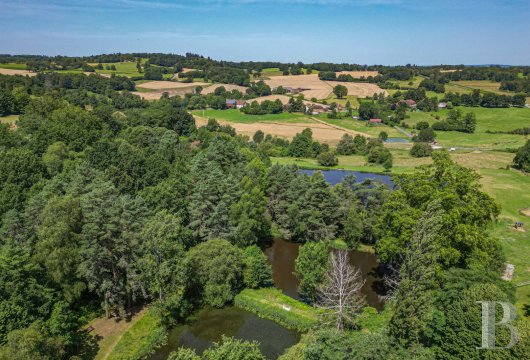Add to favorites
Log in to your personal space

In this part of the south of Limousin, where history has been written in the stone here since Gallo-Roman times, the long outline of the old coaching inn conjures up images of the convoys that travelled in clouds of dust along the dirt roads linking the regional capitals a few centuries later. People stopped in coaching inns to get supplies, rest and change horses or postmen. The house, which has been renovated, has revived this spirit of a restful stopover. Travellers can drop off their luggage in one of the four rooms in the family guesthouse, let their minds and spirits wander and relax. Nature lovers, artists, letter-writers and other dreamers will find peace and inspiration in the heart of an area that has carefully preserved its rural character.
We settled in Limousin 20 years ago and our family home in the Monts d'Ambazac was gradually emptying as our children left home. So we started looking for an old house to restore. Funnily enough we decided to look for something even bigger, so that we could create a unique place to welcome people and share moments together. After the forests of Haut-Limousin, we wanted to change to the gently wooded countryside of the Périgord-Limousin regional nature park, with its more open landscapes and Occitan farm architecture, already well-adapted to the effects of climate change.

Situated on one of the historic routes used by postmen between Limoges and Bordeaux, this former coaching inn was built in 1631 at the southern end of a medieval village dominated by a 12th-century keep. The solid building stretches over more than 50 metres. Its stone terrace on the west facade leads to an English-style garden with two ponds. Redesigned and extended over the centuries, the two adjoining houses have now become one. They are linked by long corridors leading to seven bedrooms on two floors, four of which are used for rental, as well as three living rooms with massive fireplaces. The beautifully pitched Perigord-style tile roof is topped with a finial and dotted with simple dormer windows. The openings let in light from east to west. Gallo-Roman cellars at the bottom of the building keep the apartments cool in hot weather.

The "La Buchille” hamlet, from the Occitan "buschilla" meaning "little log" or "twig", is famous for its Gallo-Roman ruins. Various sources believe that the current house was built on a much older residence, perhaps a fortified house built to defend a neighbouring abbey. It became a coaching inn in the 17th century, providing accommodation for postmen and travellers. The horses and carriages were housed in the stables on the other side of the road. It is said that La Pompadour used to stop here on her way to her lands. The coaching inn carried on for 150 years. In the 19th century, it was converted into a home for the Boulenger de la Buchille family, who built the Puy de la Bar chapel. In the early 20th century, part of the house was used as the local school until the end of the Second World War.
We give guests the chance to get together and share with others, in the spirit of a "boarding house", an "inter-generational community" or an artist's residence. We welcome people all year round for short or medium-term stays (up to 4 months). We offer a comfortable rural setting, especially for people in moments of transition - looking for rest, reflection, inspiration, writing or seasonal employment in the region. In a living area reserved for our guests there is a fully-equipped shared kitchen, an open lounge-dining room with a large fireplace and a utility room. The grounds and ponds can be freely accessed in fine weather. We supply tables and garden furniture, deckchairs and hammocks.

Walkers, whether on their own or with others, will discover the immense Fayat forest and unspoilt landscapes dotted with springs, valleys and hills. Medieval ruins can be found within walking distance of the house. There is the 12th-century feudal keep overlooking the castle mound and the Puy de Bar chapel which dominates the Breuilh valley from a 500 metre altitude as well as the old gold mines that are vestiges of the former wealth of the region. Further afield, you can explore the castles and manor houses hidden amongst the dense vegetation, which stays fresh and green in all seasons. Walking, horse-riding or cycling tours can be rounded off with a swim in the local lake or a spot of fishing. Last but not least, there is the Musée d'Art Naïf in Vicq-sur-Breuilh, the circus and poetry festivals, and the Maison du Père Castor in Mauzac. In terms of good places to eat, we recommend the Moulin de la Gorce restaurant in La Roche-l'Abeille, the Escala Dau Lemosi inn in Meuzac and the Dupuytren inn in Pierre-Buffière.
120 € - 220 € per week-end
There are two bedrooms on the ground floor and two others on the first floor. All have en-suite bathrooms and private toilets. Only the main entrance and staircase are shared with the owners. In a living area reserved for our guests there is a fully-equipped shared kitchen, a utility room and a lounge-dining room with a large fireplace. Minimum two-night stay.
ref 546937
350 € - 450 € per week
120 € - 220 € per week-end
There are two bedrooms on the ground floor and two others on the first floor. All have en-suite bathrooms and private toilets. In a living area reserved for our guests there is a fully-equipped shared kitchen, a utility room and a lounge-dining room with a large fireplace. Only the main entrance and staircase are shared with the owners. Here, each gite has a bedroom and bathroom with access to the communal areas.
ref 546937

 A link to enter a new password has been sent to you by email.
A link to enter a new password has been sent to you by email.